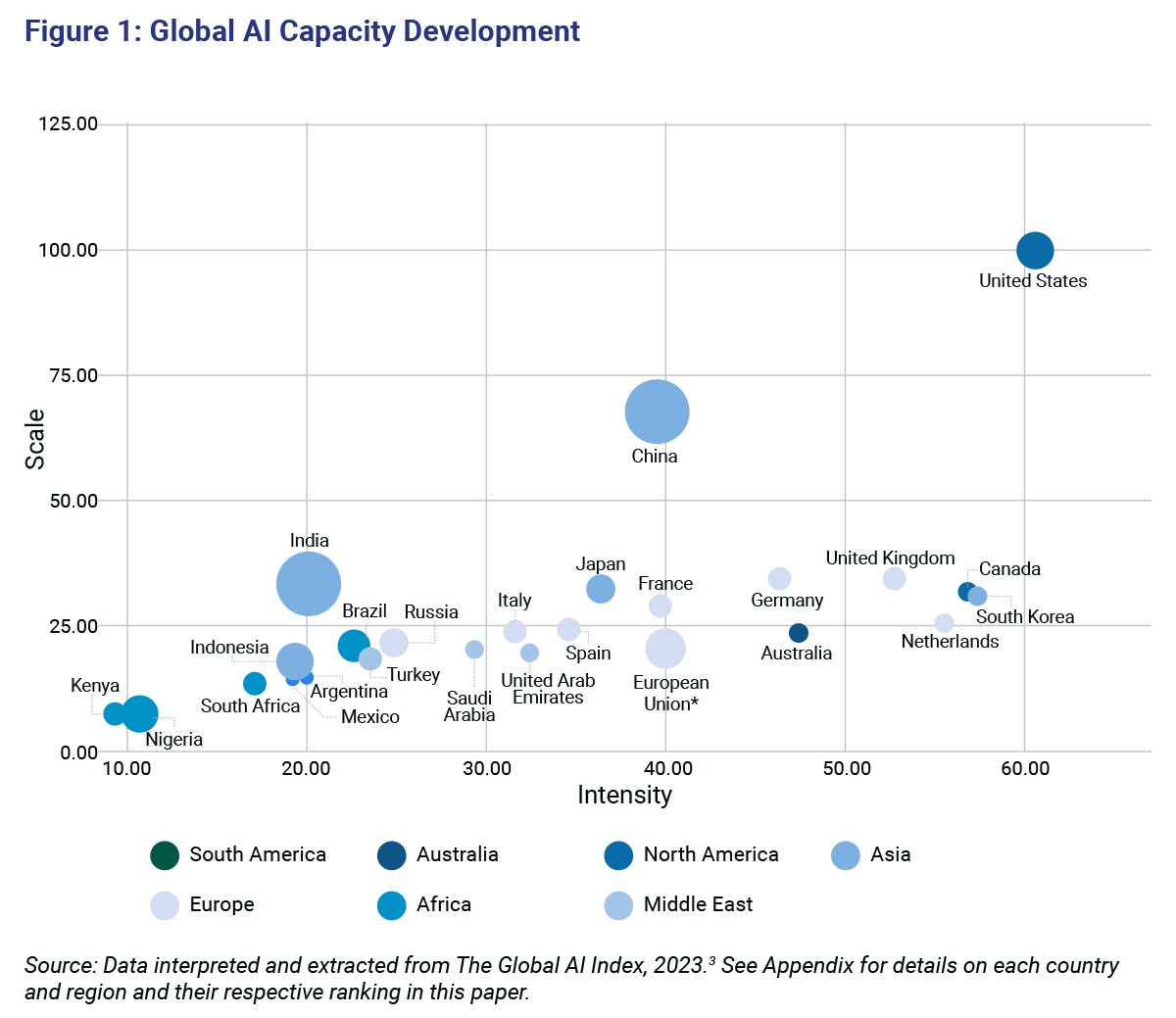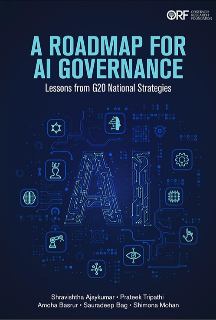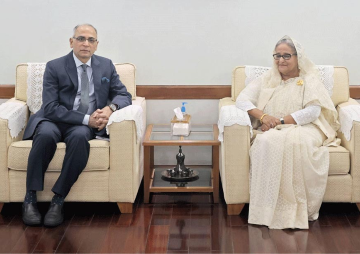Executive Summary
The rapid evolution of artificial intelligence (AI) is poised to create societal transformations. Indeed, AI is already emerging as a factor in geopolitics, with malicious non-state actors exploiting its capabilities to spread misinformation and potentially develop autonomous weapons. To be sure, not all countries are equal in AI, and bridging the “AI divide” between the Global North and South is vital to ensuring equal representation while addressing regulatory concerns and the equitable distribution of benefits that can be derived from the technology.
Most G20 members have established comprehensive national AI strategies, notably technology giants like the United States, United Kingdom, China, and countries of the European Union. Global South nations such as Brazil, Argentina, and India, despite economic constraints, are demonstrating progress in leveraging AI in areas like social services and agriculture. Future strategies must anticipate emerging threats like Generative AI (GenAI) and Quantum AI, prioritising responsible governance to mitigate biases, inequalities, and cybersecurity risks.
The G20 serves as a crucial forum for seeking collective solutions to these concerns, especially for countries of the Global South. The inclusion of the African Union as a permanent member of the G20 in 2023 underscores efforts to promote inclusivity. The G20’s emphasis on harnessing AI responsibly, as outlined in the New Delhi Leaders’ Declaration,[1] reflects a commitment to accountability, transparency, and ethical AI governance.
As AI continues to reshape societies and economies, collaborative efforts among nations, facilitated by forums like the G20, are crucial for navigating the ethical, regulatory, and geopolitical challenges posed by AI-enabled technologies. Countries can harness AI’s potential for the collective good by prioritising responsible AI governance and inclusive decision-making while mitigating risks.
Introduction
In an era where the pursuit of technological supremacy defines global leadership, artificial intelligence (AI) has emerged as a pivotal domain. The speed of technological advancement has led to concerted efforts to create governance frameworks that ensure the development and deployment of AI technologies in a beneficial and equitable manner. Global agreements and conventions on AI, such as UNESCO’s Ethics of Artificial Intelligence[2] or the Global Partnership on AI (GPAI),[3] highlight the emphasis on aligning AI growth with development goals. Such consensus at the international level has also spurred the framing of national AI strategies, which signify countries’ commitment to navigating the complex landscape of AI development. These strategies serve as blueprints for technological advancement and lay out the ethical, social, economic, and security dimensions of AI’s impact on a nation’s growth. Despite a shared recognition of the importance of AI development, nations’ ventures vary, as shown in Figure 1.
Fig. 1: Global AI Capacity Development

Source: Data interpreted and extracted from The Global AI Index (2023).[4] See Appendix for details on each country and region and their respective rankings in this report.
Figure 1 represents the scale and intensity of the AI capacity development of each country, including its supporting government regulations, the investment and involvement of the private sector, academic and research development, and infrastructure capacity. The y-axis (Scale) depicts a nation’s absolute AI capacity, and the x-axis (Intensity) reflects the existing capacity in terms of the country’s relative population and economic disposition (measured in the Global AI Index using GDP).
The Global AI Index measures the AI capacity of 62[5] countries by quantifying their investments, innovations, and technology implementation in different sectors. This report draws from the index to explore the AI capacities of the G20 countries and offers recommendations on how the platform can enhance the growth of AI.
National strategies reveal each country’s priorities and concerns; together, they indicate the direction in which global development is headed. The G20 nations, representing 85 percent[6] of worldwide GDP, can position itself at the forefront of development through AI. This report examines the national AI strategies of the G20 nations; and highlights five non-G20 countries—Nigeria, Kenya, Singapore, Spain, and the United Arab Emirates (UAE)—to discuss rapidly growing regions and examine their role as leaders outside the G20.
An earlier edition of this report, G20.AI: National Strategies, Global Ambitions,[7] published in 2022, focused on four parameters: Research and Development (R&D); skills; Information and Communications Technology (ICT) infrastructure; and data ecosystem—all common elements in every country’s national strategy. This report extends the analysis by discussing the funding ecosystem stemming from the four parameters, primarily across the public and private sector, while also separately considering investments in R&D, academia, and the military. The report also discusses the geopolitical implications of AI, including the negative impacts and threats of AI innovation and adoption. It also includes a general critique of current AI policies and discusses future-facing strategies for responsible, generative, and quantum AI, with the aim of providing a balanced perspective on the increasing importance and relevance of AI on the global scale. The report concludes with recommendations for a global AI framework and provides a roadmap for multilateral organisations like the G20, the United Nations (UN), and World Economic Forum (WEF) to establish a universal consensus on AI regulation, which remains nascent in most countries.
Read the entire report here.
[1] G20, “G20 New Delhi Leaders’ Declaration,” 2023.
[2] UNESCO, “Ethics Of Artificial Intelligence,” UNESCO.
[3] “Global Partnership On Artificial Intelligence,” GPAI.
[4] “The Global AI Index,” Tortoise, June 27, 2023.
[5] The index covers countries that have published stated initiatives related to artificial intelligence and have sufficient data available for ranking.
[6] OECD, “What Is the G20?” OECD.
[7] Antara Vats and Nikhila Natarajan, “G20.AI: National Strategies, Global Ambitions,” Observer Research Foundation, July 2022.
The views expressed above belong to the author(s). ORF research and analyses now available on Telegram! Click here to access our curated content — blogs, longforms and interviews.

 PDF Download
PDF Download




 PREV
PREV






